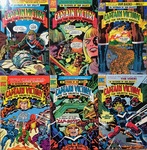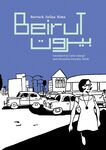
Edwin Mullhouse:
The Life and Death of an
American Writer 1943 - 1954
by Jeffrey Cartwright
a novel by Steven Millhauser
Vintage Contemporaries; 305 pages
Whether the point of this novel is to show us the adult that lies latent in the child or to reveal to us the child that the adult never manages to quite fully outgrow is a question that is difficult if not fruitless to answer. What is certain, however, is that the novel Edwin Mullhouse is brilliantly conceived. It is also shockingly well written, replete with uncannily accurate descriptions of childhood perceptions that can at times be overwhelmingly sympathetic. It is at turns funny, sad, insightful, and even profound; but above all else, it is deeply creepy: It reveals -- almost imperceptibly at first, but then slowly, incrementally, the inertia builds, like a snowball rolling down the hill of your neighborhood cemetery -- the dark, lurking, unconscious desires that shadow what we might otherwise simply take to be our bright, waking, thoughtful acts.
Originally published in 1972 by a then twenty-nine year old Steven Millhauser, Edwin Mullhouse is not the sort of novel that you would expect to be produced at that time by someone of that age. It is a novel out of synch with its time, but also ahead of it as well. It prefigures, albeit in a unique -- and most likely inimitable -- fashion, much of contemorary criticism's obsession with positing the inseparability of act and artifact, and capturing creativity in mid stride. And by exposing a connection between adult obsessions and nostalgic recollections of childhood behaviors it provided and continues to provide a bounty of insight into contemporary adult psychology.
A single conceit enables this amazing feat: We are to believe that this book is the work of twelve year old Jeffrey Cartwright. During the course of this novel the perceptions, conceptions, recollections and general over-all mind-set of a young boy left fatherless by WW II are conveyed with all the skill and adeptness that only an experienced and highly practiced adult writer could possibly accomplish, yet we are to believe that it is the work of a sixth grader. And, implausible as it may sound, we do. While the language used in the writing of this book is clearly that of an adult, it somehow manages to seem-- at the actual moments of its reading-- that it is that of a child. How exactly Millhauser manages to pull this off it is extremely difficult if not impossible to know. Suffice it to say that Edwin Mullhouse constitutes a classic example of taking something which is in fact an arduous nerve-wracking task and making it seem as though it were mere child’s play.
The single most pronounced aspect of the prose that constitutes this work is the pyrotechnic language of its descriptive passages. In capturing the visual perceptions of children-- or at least boys-- it is simply unsurpassed. A sample may be had by clicking here.
It is at times hard to resist-- during and after the reading of this work-- the thought that Edwin Mullhouse is the secret font of a stream that has been irrigating and nourishing some distant and obscure fenced off field of popular culture about which we think we might have heard tell a tale or two but are never quite sure as to the veracity or accuracy of the reports. In the literature, film and-- perhaps especially-- the comics of the last few decades, we can’t help but notice faint hints of flavor, subtle aromas, and distant echoes which seem, now, after becoming familiar with it, to have somehow emanated from this work.
The inescapable conclusion one reaches after completing Edwin Mullhouse is that it has earned the right to be considered as a fixture in the firmament of 20th Century American literature. It may not shine as brightly as some others, but it is there nonetheless, its light traveling to us on a unique wavelength, neither replicated nor even approximated by any other.




















